Japan and WHO officially launch project to provide emergency medical assistance to 2.7 million people in 29 drought-affected districts in Somalia
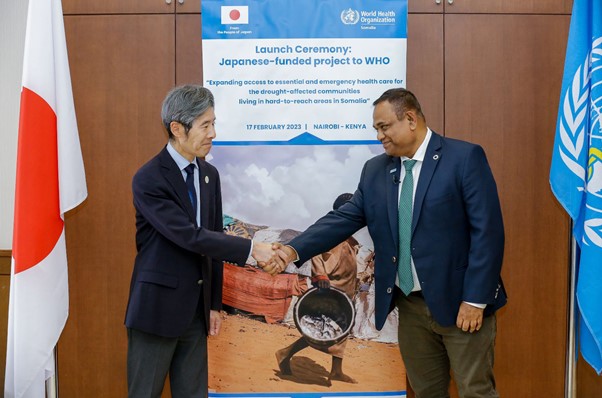 H.E. Ken Okaniwa, Ambassador of Japan to Somalia and WHO Representative Dr Mamunur Rahman Malik
H.E. Ken Okaniwa, Ambassador of Japan to Somalia and WHO Representative Dr Mamunur Rahman Malik
Nairobi, 22 February 2023 – The World Health Organization (WHO) Somalia Country Office and the Government of Japan have joined hands and officially launched a drought emergency response project that aims to reach over 2.7 million people across 29 drought-affected districts with critical health interventions.
The project, entitled “Expanding access to essential and emergency health care for the drought-affected communities living in hard-to-reach areas in Somalia”, will not only contribute to improving access to critical and life-saving health and nutrition services, it will also build resilience of primary health care system in the country towards achieving universal health coverage (UHC). The launch ceremony was hosted by H.E. Ken Okaniwa, Ambassador of Japan to Somalia, in the presence of the WHO Representative to Somalia Dr Mamunur Rahman Malik.
This funding from the Government of Japan, under the Japanese supplementary budget for 2023, is coming at an important time as Somalia is experiencing one of the worst droughts in its history. More than 7.8 million people have been affected by the worsening drought conditions, and an estimated 1.8 million children face severe acute malnutrition. Indeed, this support will enable WHO, as well as Federal and State-level Ministries of Health to reach the most vulnerable populations with emergency health care services, including those who are internally displaced and severely impacted by the drought.
“The people and Government of Japan remain committed to supporting the people of Somalia, especially at a time when more than 70% of the population are not only facing severe food insecurity, but the lives of more than half of the country’s children under 5 years of age are at stake owing to the possibility of disease outbreak, malnutrition and famine. We are confident that our partnership with WHO will help to avert this situation, while simultaneously helping to strengthen Somalia’s health system and progress towards UHC,” said H.E. Ken Okaniwa, Ambassador of Japan to Somalia.
Over a one-year period, this project will help to expand community-based and integrated health and nutrition interventions (especially to children, pregnant and lactating women, and internally displaced persons), strengthen disease surveillance, improve service delivery at the district level by equipping health care units, and establish referral linkages between communities and primary healthcare facilities for enhanced quality and continuity of care, thereby helping to reduce preventable morbidity and mortality among vulnerable communities. WHO will achieve this by deploying over 2100 community health workers and establishing 148 mobile outreach teams to increase access to life-saving services at the community level, as well as by establishing and supporting 64 stabilization centres at health facilities to treat children with severe acute malnutrition with medical complications, 9 cholera treatment centres and 280 primary health care centres in drought-affected districts. As a result of these interventions, WHO will provide critical health services to millions of people in need, including in remote and hard-to-reach areas.
The WHO Representative to Somalia Dr Mamunur Rahman Malik, in his welcome address mentioned that, “WHO has been struggling to keep pace with the acute and overwhelming demand for health care for the vulnerable populations severely impacted by the ongoing drought”. He continued, “thanks to this very timely and much-needed support from the Government of Japan, WHO will be able to sustain its critical and life-saving health interventions in the affected areas. I also take this opportunity to urge all donors and partners working in Somalia to support scaling up our humanitarian efforts to keep the health impacts of the drought to a bare minimum that is acceptable to us”.
This support from the Government of Japan will thus be instrumental in helping to improve the lives and well-being of Somalis, as it will contribute to reducing preventable mortality and morbidity, as well as advance UHC through enhanced service delivery. With this support, WHO Somalia will continue to save lives and improve the health outcomes of people in need. WHO takes this opportunity to express its appreciation to the Government and people of Japan for this critical contribution.
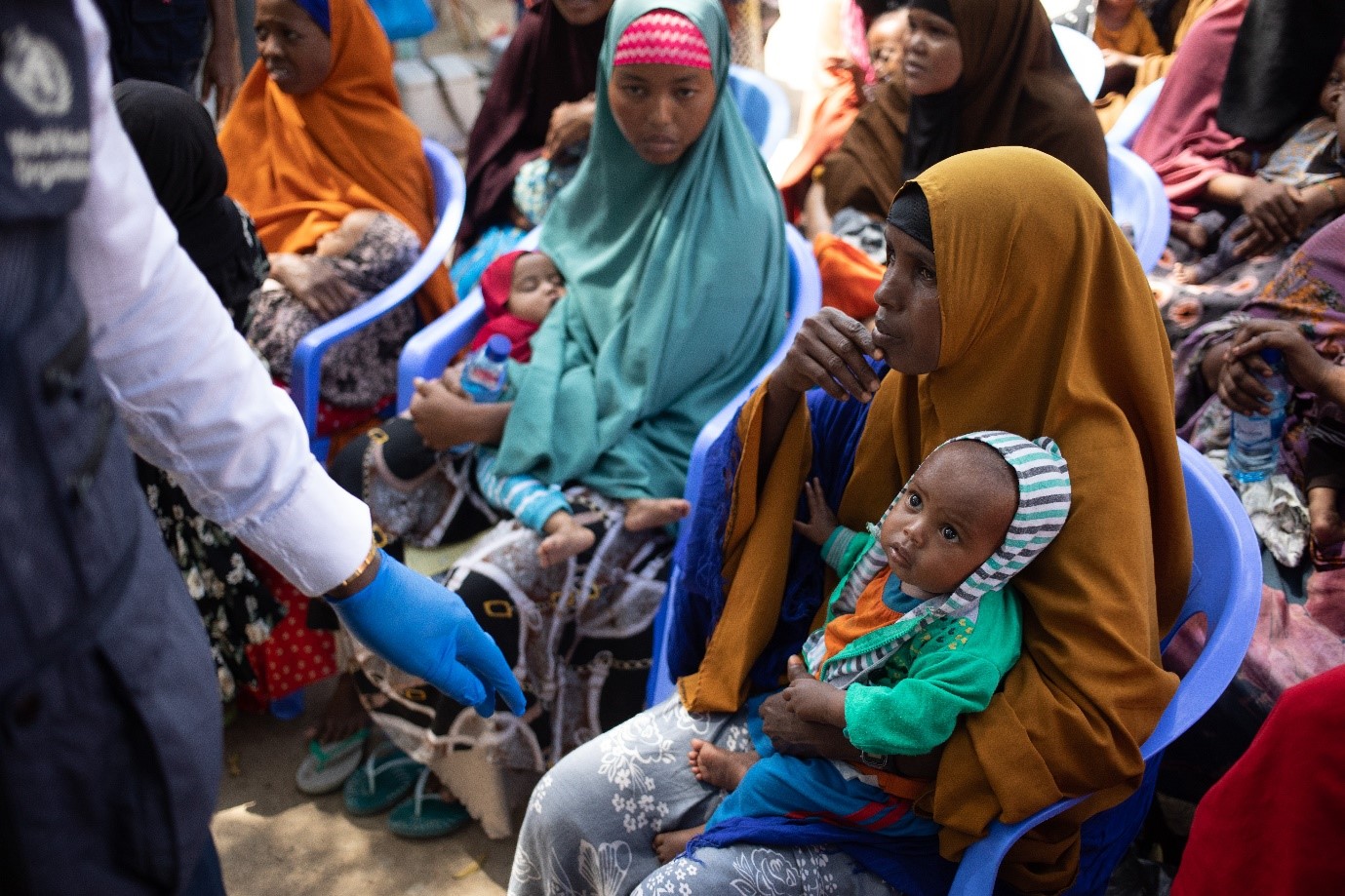 Women and children under 5 are experiencing the worst impact of an unprecedented drought in Somalia. Credit: WHO/Somalia
Women and children under 5 are experiencing the worst impact of an unprecedented drought in Somalia. Credit: WHO/Somalia
For additional information, please contact:
Kyle DeFreitas
WHO Somalia External Relations Lead
Fouzia Bano
WHO Somalia Communications Officer
Chief of Staff ai
-----------------
Related links
Japan supports WHO to expand access to health for all in drought affected communities in Somalia
WHO supports nationwide integrated immunization campaign in the midst of drought
“God has listened to our prayers” claims a Jamame elder as WHO sets up first health camp in a decade
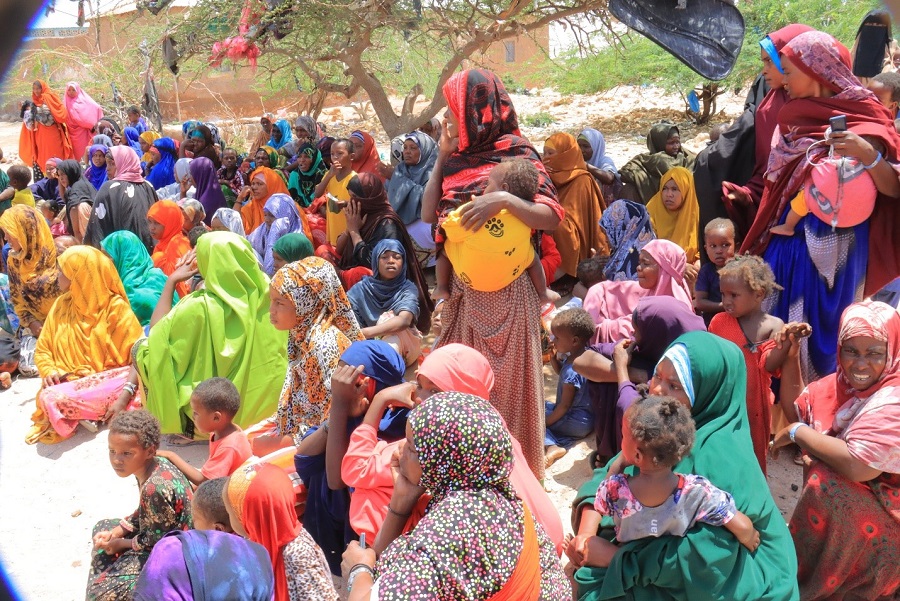 Demand for health services continues to grow in previously inaccessible Jamame district as WHO sets-up first temporary health camp in a decade. Credit: WHO/Somalia
Demand for health services continues to grow in previously inaccessible Jamame district as WHO sets-up first temporary health camp in a decade. Credit: WHO/Somalia
Kismayo, 12 February 2023 – “God has listened to our prayers and for the first time in 10 years we are seeing public health professionals supported by the World Health Organization (WHO) providing life-saving health services to our elderly, women and especially children suffering from multiple health problems,” said one of the village elders Hassan Sheikh Yusuf hailing from Warooky village of Jamame district in Jubaland state.
Jamame is an agrarian district situated 60 kilometres northeast of Kismayo. Locations west of Juba river in Jamame district are part of the newly liberated areas in Somalia where the population has not seen any regular medical help in years. The authorities recently reclaimed part of this district from non-state actors and requested the international organizations to extend humanitarian services to the population on an urgent basis. Working under an Integrated Response Framework (IRF), endorsed by the humanitarian country team in October 2022, WHO, UNICEF and the World Food Programme immediately started joint health, water, sanitation, and hygiene (WASH) and nutrition support in parts of Jamame district, primarily focusing on Baarka, Warkooy and Sanguuni towns and its nearby villages.
Residents of Jamame district confirmed that the medical teams supported by WHO are the first one to arrive in their district in more than a decade. “Provision of health services in these God-forsaken areas is critical and as soon as we could manage to get access to the area, we sat down with the elders, established our mobile camps and started providing life-saving consultative and referral health services to the locals. We believe that every single life saved is like saving the whole of humanity and we literally did that in the shortest span of a few months,” said Abdullahi Hussein, WHO Public Health Officer for Jubaland.
Soon after deployment of WHO-supported teams revealed that the district had no immunization coverage, no tuberculosis (TB) or maternal, newborn, child and adolescent programme and communities were living without any public health services. Drought seems to further complicate the situation for the locals as an estimated 70% of inhabitants of Jamame district are affected by drought following 4 consecutive seasons of below average rainfall.
WHO, in collaboration with the State Ministry of Health, deployed 3 mobile medical teams consisting of 5 medical professionals each in Warkooy, Baarka and Sanguuni villages. Initially the teams were deployed for 4 days a week for 6 weeks but owing to the severity of the situation and demand from the locals, WHO had to extend the mission for another 6 weeks and is likely to continue this because more nearby villages have started reaching out to Jamame for consultations and various available health services.
“The main goal was to assess and ensure the provision of medical services to the affected communities in these previously inaccessible areas. Circumstances were not ideal and residents, including women and children, were suffering from multiple diseases, including diarrhoea and measles, intestinal worms, pneumonia, and bronchitis. Our teams had to set up a temporary camp inside the district to immediately start outpatient consultations, vaccination of children and provision of various supplements to children and women. We also had to send our teams to run a door-to-door campaignto raise awareness on preventive measures against epidemic-prone diseases and for adopting a healthy lifestyle besides establishing their linkage with nearby health facilities,” said Munira Aden Saleh, one of the first medical professionals providing life-saving treatment to locals.
Since the deployment of the WHO-supported teams in the first week of October, medical teams have provided medical consultation to 3861 residents of Jamame, including 1955 children under 5. More than 8917 children were screened for malnutrition, of whom 1865 were diagnosed as severely malnourished and 826 were referred to an outpatient therapeutic feeding programme and stabilization centrers in Kismayo General Hospital. Another 2592 cases with diarrhoea were treated with oral rehydration salts, 4281 received supplements like vitamin A and deworming tablets while 5706 children were vaccinated against various childhood diseases, including polio.
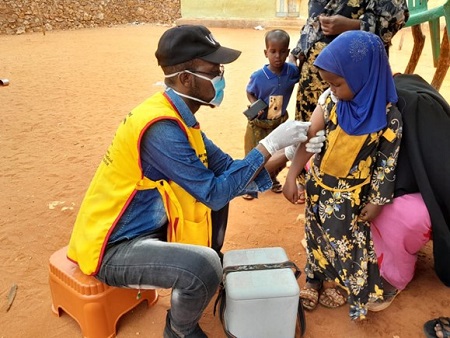 WHO-supported outreach vaccinator administers vaccine to one of 5706 children in Jamame district. Credit: WHO/Somalia
WHO-supported outreach vaccinator administers vaccine to one of 5706 children in Jamame district. Credit: WHO/Somalia
Initial consultations with locals also resulted in referring patients with suspected pneumonia, severe cold, worms and infection, skin infection and scabies to Kismayo general hospital for further case management, including oxygen therapy. “We are trying to connect these recently accessible populations to nearby established health facilities to not only provide them much needed medical treatments but also to help restore their confidence in public health facilities and make them part of various health interventions initiated from these health facilities,” said the Director of Kismayo General Hospital Arab Ibrahim Yasin.
For additional information, please contact:
Kyle DeFreitas
External Relations Officer
Fouzia Bano
Communications Officer
Related links
Drought-survivors arrive at internally displaced person camps to "live another day"
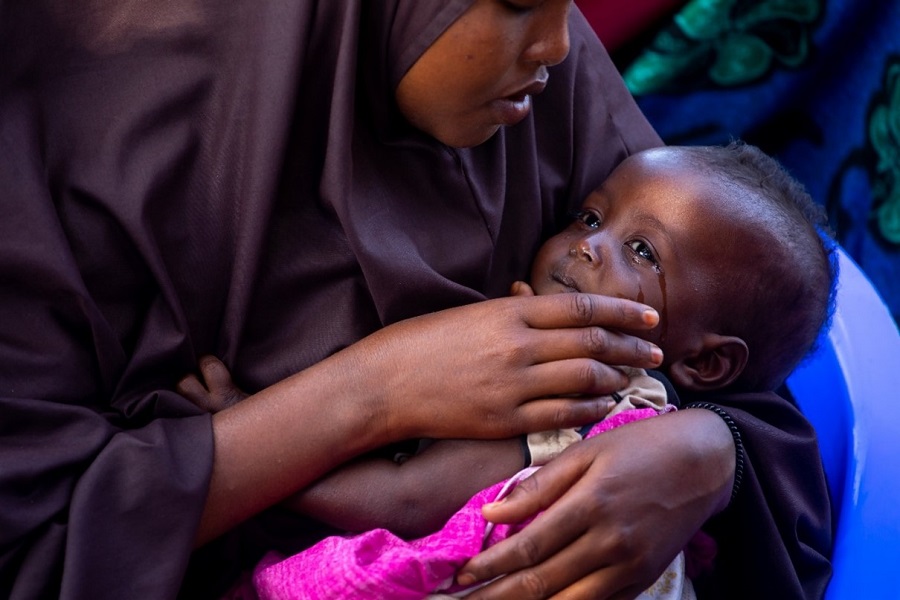 A mother and child after travelling 350 kilometres on foot arrive at Daynile IDP camp in search of food, water and health services. Credit: WHO/Somalia
A mother and child after travelling 350 kilometres on foot arrive at Daynile IDP camp in search of food, water and health services. Credit: WHO/Somalia
WHO integrated health response services help save lives as severe drought triggers population displacements across Somalia
Mogadishu, 9 February 2023 – “After walking for over 350 kilometres with a caravan of about 25 people, including women, children and older people, we have arrived alive and with enough energy to live another day. But there are many we have buried in our villages because of this unending drought,” remarked Ali Abdullahi (55 years) while settling down the handful of belongings that he was able to carry in this life-saving and heart-wrenching week-long journey from the remotest southern village of Galmudug to reach this camp for internally displaced persons (IDPs) in Daynile district of Banadir region.
Every day, an estimated 15 to 20 families are arriving in the suburbs around Mogadishu, including Daynile district. Most of the people arrive on foot and the majority of them have identical stories like Ali Abdullahi to share with the locals and humanitarian teams receiving, registering and treating them at the camp. Daynile, one of the 17 districts within the limits of Banadir Regional Administration, has just over 117 000 households while the camp for IDPs houses over 500 000 people and is growing with every passing day. Owing to decades of conflict and instability, climatic shocks like floods, drought, cyclone and the COVID-19 pandemic, Somalia’s overall and Daynile district’s fragile health system struggles to provide essential health and nutrition services. Now, with IDPs arriving in significant numbers, health facilities in host communities cannot adapt to the increasing needs. Owing to extreme food hunger among the population living in this camp and catastrophic living conditions with no access to safe water and sanitation and hygiene coupled with lack of basic health care for these people who were denied any access to health care for decades before they were displaced to this camp, famine (Integrated food security phase classification 5) has been projected in this district of Mogadishu between April and June 2023.
“We are finding the camp being extended almost daily to accommodate new drought-survivors arriving from various parts of Somalia to find the very basics of life like drinkable water, some food and medical help. These people are coming with almost nothing but with a big burden of diseases and stories of their dead relatives and livestock,” said the WHO-supported health worker, Binte Subah, deputed at the Daynile camp set up for IDPs to provide basic health services to these survivors.
Binte Subah is one of the 70 health workers assigned to provide integrated health services in the camp. To manage the initial influx of displaced persons in the camp, WHO deployed health workers for 4 days a week for a month. But with the continued pouring in of new drought survivors, WHO has extended the mission for another month and will assess the demand of services at the end of next month.
The integrated outreach teams have identified several key health issues affecting people in the IDP settlement and the Daynile community more broadly, including malnutrition, epidemic-prone diseases like acute water diarrhoea and measles, pneumonia, anaemia in pregnant woman, and skin infections due to lack of water intake. These teams have carried out screening to identify and refer children with malnutrition to outpatient therapeutic programmes and at stabilization centres.
“I am thankful to WHO health teams for saving the life of my wife and newborn child by giving them timely medications after we arrived at the camp in Daynile. Soon after giving birth to our child, we had to leave our village because our water wells have dried, our livestock have perished and there are no signs of rain thus we were left with no other option but to migrate in search of food and health services leaving everything behind. In this fragile state, she was walking with us for almost 120 kilometres to reach this camp and both were in a really bad health when we put our foot in the camp,” remarked Abdirahmat with tears in his eyes while receiving the free medicines and supplements for his wife and newborn at the WHO medical centre – set up on the roadside under the shadow of a tree inside the camp.
WHO first to reach security-challenged areas
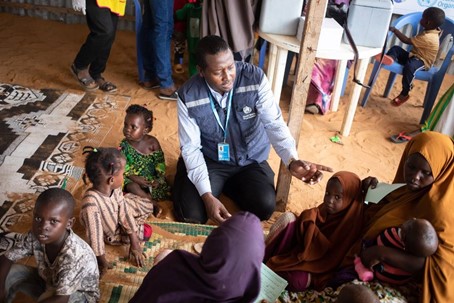 WHO teams serving displaced people by setting up a temporary camp on the roadside under a tree in Daynile camp, Mogadishi. Credit: WHO/Somalia
WHO teams serving displaced people by setting up a temporary camp on the roadside under a tree in Daynile camp, Mogadishi. Credit: WHO/Somalia
The World Health Organization Country Office in Somalia undertook a high-level mission led by Mamunur Rahman Malik, WHO Representative and Head of Mission WHO Country Office Somalia, to Daynile district in Mogadishu – the first high-level mission by any UN and international agency to the areas since 2021. The district of Daynile is highly contested and the security risk remains high with 54 incidents, including armed conflict and crime in the last 3 months of 2022. As such providing necessary humanitarian support to new arrivals in the district has been challenging and there is no health post within the IDP camp.
The district is at risk of famine and currently experiencing an influx of internally displaced persons as a result of the ongoing drought – one of the worst that the country has faced. To date, the drought has affected around 7.8 million people across Somalia and over 1 million have been displaced, on top of 2.5 million people who were already internally displaced, in search of food, water and health care.
WHO, since 5 January 2023, started working with the Ministry of Health to deploy integrated outreach teams to provide basic health care services, routine immunization and identify and refer malnourished children and patients for treatment at stabilization centres, reproductive, maternal, neonantal and child health and trauma centres. These teams have been providing health services for 4 days per week for an initial period of one month, while longer term arrangements are being made. In total 70 health care workers, including 43 women, were deployed following integrated primary health care and nutrition training.
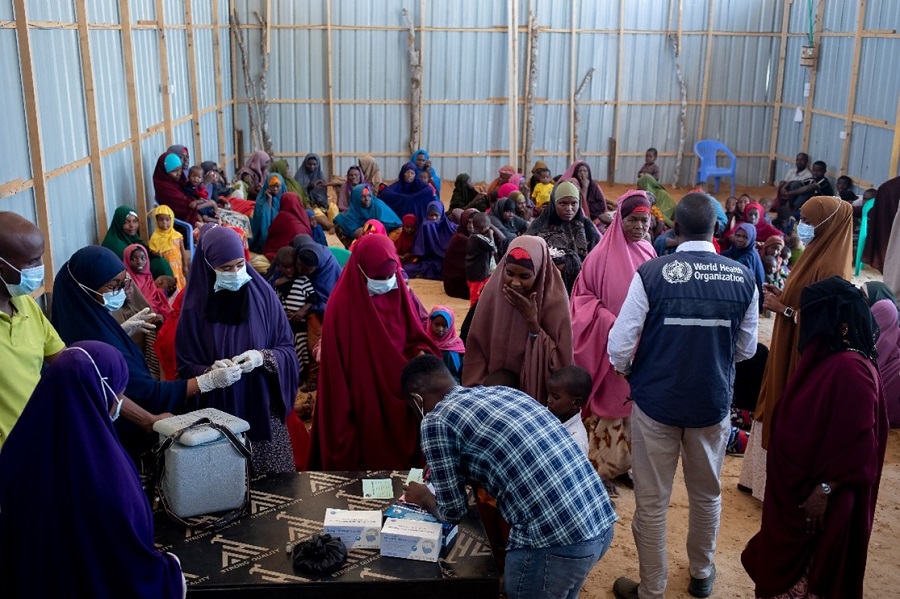 New arrivals at the IDP camp in Daynile District is rising by the day as WHO continues to provide them consultations, treatment, immunization, screening, and referral services in Mogadishu. Credit: WHO/Somalia
New arrivals at the IDP camp in Daynile District is rising by the day as WHO continues to provide them consultations, treatment, immunization, screening, and referral services in Mogadishu. Credit: WHO/Somalia
When the mission arrived, they found outreach teams providing services to mothers and children under the shade of a tree in the middle of the IDP camp. Abdulkadir Mohamed Abdi, WHO’s Surveillance Officer said, “Communities living in this IDP settlement are living in precarious situations and do not have access to basic needs such as the provision of health care services, drinking water, food and proper shelter. We witnessed long queues for people waiting provision of basic primary health care where WHO deployed integrated outreach teams inside the IDP camp. Mothers with their children who were waiting to receive services were very excited since they have never before received such services and there were many zero-dose children receiving the first vaccination for their lifetime.”
 High-level missions from WHO with the Ministry of Health helps to ensure quality of public health interventions and restore confidence of people in government. Credit: WHO/Somalia
High-level missions from WHO with the Ministry of Health helps to ensure quality of public health interventions and restore confidence of people in government. Credit: WHO/Somalia
Community members expressed their appreciation for the services provided by WHO. However, they also shared challenges such as shortages of supplies, including medication to treat urinary tract infections. Outreach teams shared that there was a lack of health education in the community and there was a need for greater community engagement and communication, including household visits to promote the services available.
For additional information, please contact:
Kyle DeFreitas
External Relations Officer
Fouzia Bano
Communications Officer
Note to editors
Please see the links below for additional information on WHO’s drought response across Somalia:
- /somalia/news/somalia-launches-campaign-to-vaccinate-one-million-people-against-cholera.html
- /somalia/news/who-supports-nationwide-integrated-immunization-campaign-in-the-midst-of-drought-261-million-children-vaccinated-against-measles-and-polio.html
Japan supports WHO to expand access to health for all in drought-affected communities in Somalia
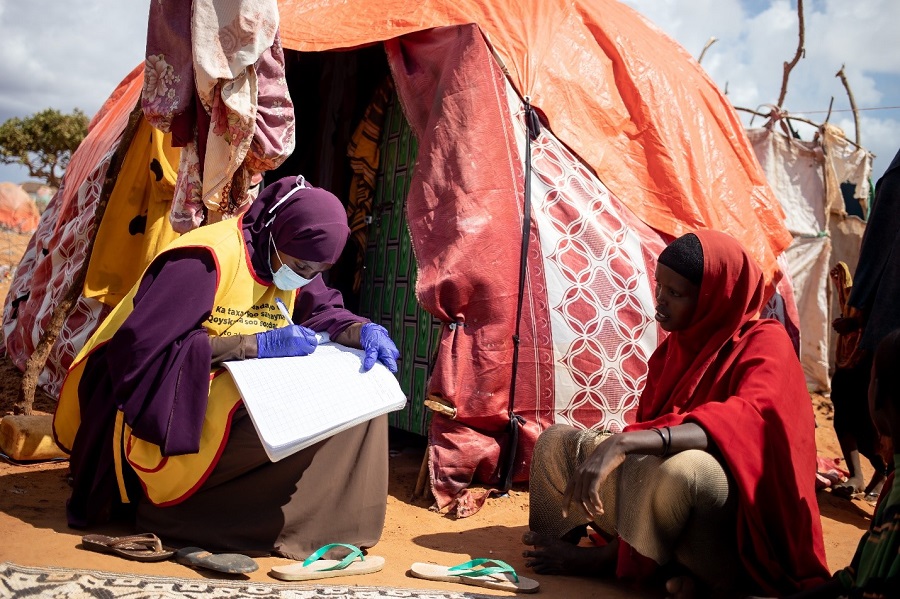 WHO-supported community health worker conducting house-to-house visits in an internally displaced persons camp in Kismayo, Jubaland. Credit: WHO/Ismail Taxta
WHO-supported community health worker conducting house-to-house visits in an internally displaced persons camp in Kismayo, Jubaland. Credit: WHO/Ismail Taxta
Mogadishu, 6 February 2023 – The Government of Japan has recently allocated a grant to the World Health Organization (WHO) country office in Somalia to expand access to life-saving health care for vulnerable communities living in hard-to-reach areas that are severely impacted by the ongoing drought. With 7.8 million people in need of humanitarian assistance, the current drought is one of the worst in Somalia’s history.
Recognizing the need for an urgent response to save lives, the Government of Japan has provided these funds through the Japanese Supplementary Budget. This funding will be used to strengthen community-based health and nutrition interventions, as well as support primary health care and nutrition stabilization centres in the hard-to-reach areas. This funding will allow WHO to bring health care close to these vulnerable communities living in catastrophic living conditions and improve access to basic and lifesaving health care services in some of the worst hit areas in the country. The funding will also be used for real-time detection and response to any epidemic by frontline health workers.
The Government of Japan has been a global leader in enhancing universal health coverage and the Sustainable Development Goals’ core principle to ensure that “no one is left behind.” This partnership between WHO and the Government of Japan will help to improve access to health care for drought-affected communities, especially those living in hard-to-reach areas and contribute to building a resilient primary health care system, which are foundational for achieving universal health coverage in fragile settings.
“Ensuring that no one is left behind is central to the achievement of universal health coverage,” says H.E. Ken Okaniwa, Ambassador of Japan to Somalia. “This funding will support WHO and the Government of Somalia to meet the urgent health care needs of people affected by the severe drought and food insecurity crisis, including women and children who bear the brunt of these catastrophic events, as well as contributing to the resilience and capacity of the health system into the future.”
Targeting 29 of the districts most affected by drought, the funding will support WHO to deploy community health workers in hard-to-reach areas and also provide outreach services for the vulnerable communities. Approximately 2.78 million vulnerable people including over 300 000 internally displaced people living in catastrophic and dire living conditions in these areas are expected to benefit from this expanded life-saving health care support.
WHO will also provide essential medical supplies, including life-saving medicines, to the primary health care units and nutrition stabilization centres across these districts. This will help these basic health care units to meet the extra demand for health care and continue with routine and essential health care services without any disruption. As the epidemic risk is very high in these vulnerable communities owing to poor access to water and sanitation services, WHO’s support through the deployment of community health workers and community outreach services will ensure that frontline health workers detect and respond to any health threats early on.
“We welcome this funding from the Government of Japan and extend our utmost gratitude for the support. We look forward to an ongoing partnership, rooted in our shared commitment to universal health coverage which is also anchored in building a resilient primary health care system,” said the WHO Representative to Somalia Dr Mamunur Rahman Malik. “With famine looming and millions of people impacted by the unprecedented drought, we must act now to save lives and prevent major outbreaks of infectious diseases. We know that in cases of prolonged food insecurity and famine, more people die from disease than from malnutrition and hunger combined. It will be children, women and other vulnerable people who will pay the price of our inaction. We have the tools to prevent children dying from malnutrition, to stop the spread of diseases like cholera and measles and to avert unnecessary, preventable deaths. With a coordinated, scaled-up response, made possible by donors like the Government of Japan, we can save thousands of lives if we act now.”
Background information
WHO has been able to reach nearly 6.3 million people, about 75% of the people who are in need, with life-saving treatments, essential health and nutrition interventions. These services are being delivered through over 2164 community health workers, 148 mobile outreach teams, 64 stabilization centres and 280 primary health care centres in drought-affected districts. Somalia is currently facing one of the most severe droughts in its history, with a looming famine and possibility of severe loss of life due to hunger, malnutrition and disease. Currently, 7.8 million people are affected and 1.1 million are displaced (on top of 2.5 million who were already displaced) as they are in search of food, water, shelter, health care and any assistance available. Furthermore, the drought is increasing endemic-prone diseases, putting millions at risk. For example: 3.5 million persons lack sufficient access to water; and 6 million continue to face severe food shortages, with approximately 1.4 million children facing acute malnutrition, including 329 500 likely to become severely malnourished. Moreover, as of 31 December 2022, a total of 15 635 cases of cholera, including 87 deaths (case-fatality rate 0.6%), were reported from 26 drought-affected districts. In addition, 132 617 cases of acute diarrhoeal disease and 17 536 measles cases were also reported during the same period in the drought-affected districts.
For additional information, please contact:
Kyle DeFreitas
External Relations Officer
Fouzia Bano
Communications Officer
Related links


